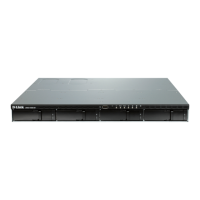What causes a D-Link Enclosure file system expansion failure?
- HhornadamSep 12, 2025
Confirm free capacity. If capacity is enough, restart the NAS. If this message appears repeatedly, contact Technical Support.

What causes a D-Link Enclosure file system expansion failure?
Confirm free capacity. If capacity is enough, restart the NAS. If this message appears repeatedly, contact Technical Support.
What to do if D-Link Enclosure temperature is above the warning threshold?
If the D-Link Enclosure chassis is overheating, check for airflow around and through the chassis, and verify that all fans are working. Replace fans as needed.
What to do if D-Link Enclosure controller temperature is above the critical threshold?
If the D-Link Enclosure controller is seriously overheating, check for airflow around and through the controller, and verify that all fans are working. Replace fans as needed.
What to do if D-Link Enclosure controller temperature is above the warning threshold?
If the D-Link Enclosure controller is overheating, check for airflow around and through the controller, and verify that all fans are working. Replace fans as needed.
What does it mean when a SMART error is received on a D-Link Enclosure?
A disk drive reported a SMART error. If this message appears repeatedly, replace the disk drive.
How to fix D-Link Enclosure logical drive initialization that marks the logical drive offline?
Initialization failure occurred because of a failed disk drive. Replace the disk drive, then delete and recreate the logical drive.
Why does creating a snapshot fail on a D-Link Enclosure?
Space is not enough to create snapshot. Reduce created snapshot size.
What to do if D-Link Enclosure redundancy check encountered inconsistent block(s)?
Check the logical drive’s inconsistent block table. Rebuild the disk array if necessary.
Why is D-Link Enclosure logical drive initialization aborted due to an internal error?
System resources are low. Reduce system load or restart the NAS.
What to do when D-Link Enclosure RAID Level migration has encountered a physical disk error?
A bad block was found on a disk drive. Migration will finish. Check the disk drive check table after migration and replace disk drive as needed.
Provides detailed specifications for the ShareCenter® Pro DNS-1550-04 hardware.
Provides step-by-step instructions for installing hard disk drives into the NAS.
Explains the procedure for safely powering down the NAS system.
Guides users through the initial configuration of the NAS system using a wizard.
Step-by-step instructions for replacing the NAS device's power supply units.
Provides instructions on how to replace the NAS control module.
Information on viewing, managing, and changing settings for physical drives.
Details on configuring and managing iSCSI connections and settings.
Step-by-step guide to creating a new disk array for storage.
Instructions on how to view, modify, and delete existing disk arrays.
Procedures for creating, viewing, and managing logical drives within disk arrays.
How to manage background tasks, set parameters, and schedule activities.
Detailed steps for downloading and applying firmware updates to the NAS.
Guide on using the performance monitor to check system resource utilization.
Instructions for resetting the NAS system to its original factory default settings.
How to configure network security policies, including IP/Domain Name settings.
How to initiate an immediate backup of files to the NAS system.
Guide on setting up automated backups at specified times or intervals.
Instructions on how to modify existing backup schedules.
How to restore files from previously created backups.
Steps to map shared folders as network drives on a PC.
Guide on configuring shared folders for use with Mac's Time Machine backup.
Step-by-step guide to initial NAS system configuration using wizards.
Instructions on enabling or disabling specific plug-in features.
How to properly reboot the NAS device for system updates or changes.
Instructions for safely shutting down the NAS device for maintenance.
Guides users through troubleshooting common issues by referencing system event logs and providing corrective actions for various components.